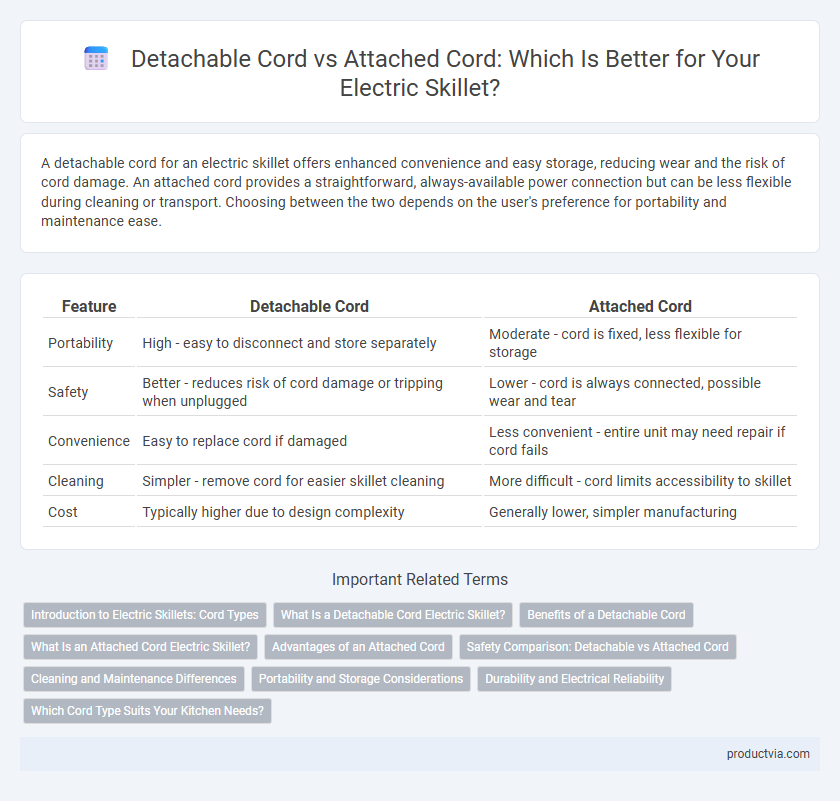A detachable cord for an electric skillet offers enhanced convenience and easy storage, reducing wear and the risk of cord damage. An attached cord provides a straightforward, always-available power connection but can be less flexible during cleaning or transport. Choosing between the two depends on the user's preference for portability and maintenance ease.
Table of Comparison
| Feature | Detachable Cord | Attached Cord |
|---|---|---|
| Portability | High - easy to disconnect and store separately | Moderate - cord is fixed, less flexible for storage |
| Safety | Better - reduces risk of cord damage or tripping when unplugged | Lower - cord is always connected, possible wear and tear |
| Convenience | Easy to replace cord if damaged | Less convenient - entire unit may need repair if cord fails |
| Cleaning | Simpler - remove cord for easier skillet cleaning | More difficult - cord limits accessibility to skillet |
| Cost | Typically higher due to design complexity | Generally lower, simpler manufacturing |
Introduction to Electric Skillets: Cord Types
Electric skillets come with either detachable cords or attached cords, each offering distinct advantages for usability and storage. Detachable cords provide easier cleaning, safe storage, and convenient replacement if damaged, while attached cords typically ensure a more secure power connection and fewer points of failure. Choosing between them depends on personal preferences for convenience and maintenance in everyday cooking appliances.
What Is a Detachable Cord Electric Skillet?
A detachable cord electric skillet features a power cord that can be easily removed from the skillet base, enhancing convenience for storage and cleaning. This design reduces the risk of cord damage and enables safer handling when the skillet is hot or not in use. Detachable cords often support universal replacement options and improve portability compared to attached cord models.
Benefits of a Detachable Cord
A detachable cord for an electric skillet enhances safety by allowing users to disconnect the power source easily, reducing the risk of tripping or electrical hazards. It also improves convenience in storage and cleaning, as the skillet can be cleaned separately without worrying about damaging the cord. Furthermore, detachable cords offer versatility, enabling the use of replacement cords or longer cords to fit different kitchen setups.
What Is an Attached Cord Electric Skillet?
An attached cord electric skillet features a power cord permanently connected to the appliance, offering simplicity and fewer parts to manage. This design minimizes the risk of losing the cord and ensures a consistent power connection during cooking. However, it may limit storage flexibility compared to detachable cord models.
Advantages of an Attached Cord
An electric skillet with an attached cord offers enhanced safety by reducing the risk of accidental disconnection during cooking, ensuring consistent power delivery. The fixed cord design also minimizes wear and tear associated with frequent plugging and unplugging, contributing to the skillet's long-term durability. Users benefit from a straightforward setup without worrying about lost or incompatible cords, providing convenience in everyday kitchen use.
Safety Comparison: Detachable vs Attached Cord
Detachable cords for electric skillets enhance safety by reducing tripping hazards and allowing easier storage, minimizing cable damage risks. Attached cords, although more secure from accidental disconnection during cooking, may pose increased danger if the cord is strained or tangled near hot surfaces. Choosing a skillet with a detachable cord offers improved safety through flexibility and damage prevention while maintaining reliable power connection when properly secured.
Cleaning and Maintenance Differences
Electric skillets with detachable cords offer easier cleaning and maintenance since the cord can be removed to prevent water damage and simplify washing the skillet. Attached cord models require more caution during cleaning to avoid moisture contact with the electrical components, increasing the risk of damage. Detachable cords provide convenience and safety by allowing the skillet body to be fully submerged or wiped without electrical concerns.
Portability and Storage Considerations
A detachable cord enhances portability and simplifies storage for electric skillets by allowing the cord to be packed separately and reducing clutter in tight spaces. This feature makes it easier to fit the skillet into bags or cupboards without tangling or damage to the cord. Electric skillets with attached cords tend to be less convenient to transport and store, as the fixed cord can restrict packing options and increase the risk of wear.
Durability and Electrical Reliability
Electric skillets with detachable cords offer enhanced durability by reducing stress on the cord connection, minimizing wear and potential damage during storage and use. Attached cords provide consistent electrical reliability with fewer connection points, lowering the risk of loose contacts or electrical failures over time. Choosing between detachable and attached cords depends on balancing ease of replacement and maintenance against optimal electrical stability for long-term skillet performance.
Which Cord Type Suits Your Kitchen Needs?
A detachable cord offers flexibility and ease of storage, reducing the risk of cord damage and making cleaning more convenient in compact kitchens. An attached cord provides a stable, uninterrupted power connection, ideal for permanent countertop placement without the worry of accidentally unplugging. Choosing between detachable and attached cords depends on your kitchen layout, frequency of skillet use, and preference for portability versus fixed setup.
Detachable cord vs Attached cord for electric skillet Infographic

 productvia.com
productvia.com